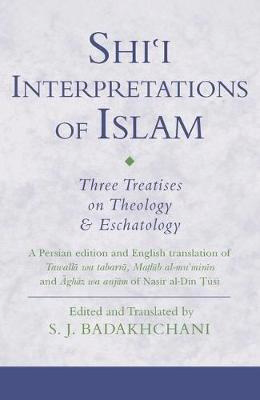One of the most prominent Muslim scholars and scientists of the medieval era, the Persian polymath Naṣīr al-Dīn Ṭūsī (1201-1274) joined the Shi‘a Nizari Ismaili community at a young age, as the armies of Genghis Khan poured across his homeland. In the course of a long and eminent career, first under the patronage of the IsmailisAdherents of a branch of Shi’i Islam that considers Ismail, the eldest son of the Shi’i Imam Jaʿfar al-Ṣādiq (d. 765), as his successor. at the fortress of AlamutFortress of the Nizari Ismailis in northern Iran, which fell to the Mongols in 654 AH/1256 CE., and later with the conquering Mongols, he produced over 150 works on diverse subjects from theology and philosophy to mathematics and astronomy. His principal works on Ismaili doctrine, the Rawḍā-yi taslīm (The Paradise of Submission) and the autobiographical Sayr wa sulūk (Contemplation and Action), are already available in English translation by S J Badakhchani. In this volume, he offers new critical editions and translations of three shorter Ismaili works by Ṭūsī, namely Aghaz wa anjam (The Beginning and the End), Tawallā wa tabarrā (Solidarity and Dissociation), and Maṭlūb al-muʾminīn (Desideratum of the Faithful). In these three treatises, Ṭūsī provides concise interpretations of key motifs in Ismaili doctrine, with special reference to the primordial nature of man, his earthly existence in relation to the imamIn general usage, a leader of prayers or religious leader. The Shi’i restrict the term to their spiritual leaders descended from ʿAlī b. Abī Ṭālib and the Prophet’s daughter, Fatima., and his destiny in the hereafter.
Acknowledgements
Introduction
The author and his works
The doctrine of qiyāma
Tawallā wa tabarrā
Maṭlūb al-muʾminīn
Aghāz wa anjām
Note on the edition and translation
The Translations
Tawallā wa tabarrā: Solidarity and Dissociation
Maṭlūb al-muʾminīn: Desideratum of the Faithful
Aghāz wa anjam: Origin and Destination
Bibliography
Index
Persian Texts
S. J. Badakhchani is a Research Associate at The Institute of Ismaili Studies. His publications include Contemplation and Action: The Spiritual Autobiography of a Muslim Scholar (1998) and Paradise of Submission: A Medieval Treatise on Ismaili Thought (2005), both published by I.B. Tauris.

